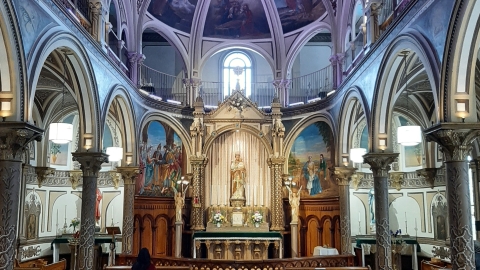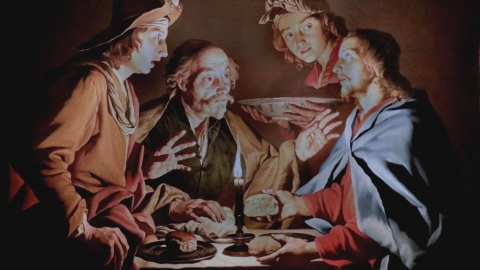Interfaith Dialogue: From Dream to Reality

Latifa Ibn Ziaten and U.S. Secretary of State John Kerry
On February 4, 2021, the Zayed Prize for Human Fraternity was awarded to the French-Moroccan activist Latifa Ibn Ziaten, founder of the association “Imad for Justice and Peace,” and to the Portuguese António Guterres, Secretary General of the United Nations.
Endowed with one million dollars, this award was created by Sheikh Abdullah bin Zayed Al-Nahyan following the signing of the Document on Human Fraternity by Pope Francis and the Grand Imam of Al-Azhar on February 4, 2019 in Abu Dhabi, United Arab Emirates.
Latifa Ibn Ziaten, of French-Moroccan origin and mother of five children, became known for her educational action in favor of peace after the assassination of her son Imad, a French parachutist, by the terrorist Mohammed Merah in 2012. Her association, which bears the name of her son, campaigns to preserve “social harmony” and advocates a dialogue of peace between religions and society.
António Guterres receives this award for his work at the head of the United Nations during the Coronavirus pandemic, as well as for his calls for a comprehensive ceasefire. He has also actively supported the recognition of the International Day of Human Fraternity [February 4], launched by the United Nations following the Abu Dhabi Declaration.
On the occasion of the presentation of the Zayed Prize, the Pope declared that today “fraternity is the new frontier of humanity,” adding: “either we are brothers or we destroy each other…This is the challenge of our century, this is the challenge of our time,” he repeated, “now is the time to listen. Now is the time for sincere acceptance.”
Francis addressed Latifa Ibn Ziaten in these terms: “Thank you for your testimony, thank you for being the mother of your children, of so many boys and girls…and today the mother of this humanity which listens and learns from you.” The recipient replied: “It will help me, today I am a second mother to many children”; before concluding: “If we manage to break down the barriers we have in our hearts, we will find our place in society and we will all be brothers.”
Several personalities wanted to give their strong support. “Friendship counts in making a difference,” said Justin Welby, Archbishop of Canterbury and friend of the Pope.
“The more we look at each other from a distance, the more we see the differences,” while “the more we look each other in the eyes, the more we see our common humanity,” said Charles Michel, President of the European Council, adding: “a chain of virtue is possible” to allow the establishment of fraternity.
Mohamed Abd El Salam, secretary of the High Committee for Human Fraternity—set up following the signing of the Abu Dhabi Declaration—called on young people to “dream” and “look to the future with a smile.”
Back to reality
On the sidelines of this flow of good interreligious feelings, the Dominican Jean Druel asserted more realistically that “this type of event remains essentially symbolic.”
This religious who lives in Cairo, where he is a researcher at the Dominican Institute for Oriental Studies (IDEO), declared to the Roman agency I.Media: “I am not sure that a fundamental work is taking place”; adding: “We haven't seen a snowball effect yet. You have two men talking and getting along. But Ahmed Al-Tayyeb [Grand Imam of Al-Azhar], when speaking with Pope Francis, commits himself in his own name; there are few initiatives on the ground.”
Because “the Sunni Muslim world is very diverse. Al-Tayyeb has a tremendous aura in Azhari circles, that is, among al-Azhar alumni. They are millions in Egypt and around the world.”
“On the other hand, he is hated by the Muslim Brotherhood. And among some non-Egyptian Arabs, he is almost unknown. In Morocco, for example, Al-Azhar represents nothing. The situation within Sunnism is extremely complex, with diverse agendas and apparent harmony.
“The forces involved are the Muslim Brotherhood, the different Salafist currents, the Sufi currents, more or less conservative or intellectual, the liberals, etc.”—Besides Shiism, the other main branch of Islam, present in Iran, Iraq, Turkey, Pakistan, Lebanon ...
Admittedly, admits Fr. Druel, Pope Francis “wants to show that a dialogue is possible with Muslims and to change many Christians’ perception of them. However, some observers believe that, given the effervescent situation within the Sunni world, the Pope may be unwise to focus primarily on relations with Al-Azhar [Sufi institution], to the detriment of other actors.”
This is the insurmountable limit of interreligious dialogue on a practical level, even before considering the doctrinal problems, which are however not slim.
Islam is not one, so that interreligious dialogue can only be addressed to one branch to the detriment of others, and then they hate each other. Concretely it is a selective dialogue not with Islam, but with one form of Islam and against the other forms.
(Sources : cath.ch/imedia/DICI n°405 – FSSPX.Actualités)
Illustration : U.S. Department of State from United States, Domaine public, via Wikimedia Commons



